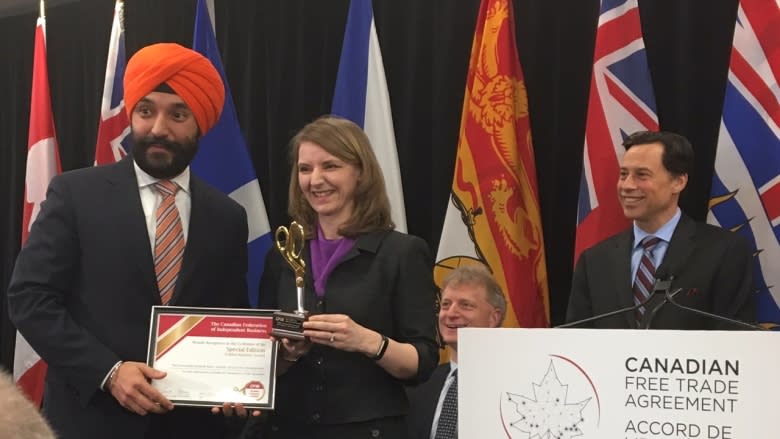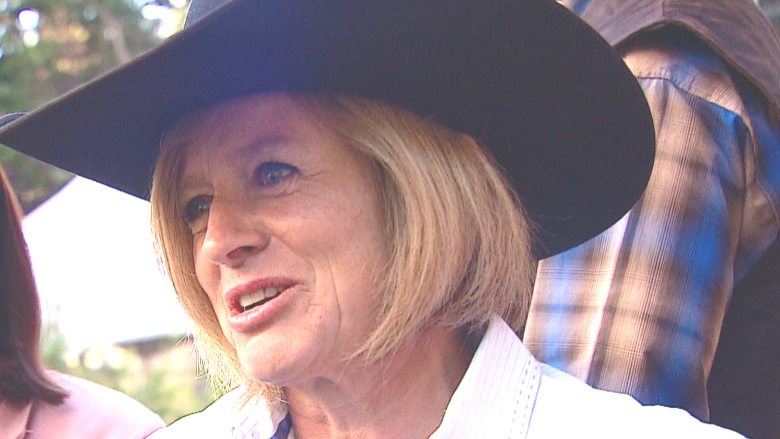Premiers' much-hyped internal trade deal hasn't amounted to much
On the day they released the Canadian Free Trade Agreement in 2017, all the provincial and territorial trade ministers were given a symbolic pair of golden scissors to remind them to start cutting interprovincial trade barriers.
The trouble is, they aren't using them.
The scissors were gifts from the Canadian Federation of Independent Business, a relentless advocacy group for whom harmonizing — and ideally, cutting — government regulations is a mantra.
Its president and CEO, Dan Kelly, said he's seen his snippy trophies proudly displayed in ministers' offices across Canada. But one year after the trade deal took effect on Canada's 150th birthday, July 1, 2017, has any tangible progress been made?
Well ...
"It's slow-going," he said. The process lacks concrete timelines. He's still waiting for the interprovincial trade committee to set priorities, let alone roll back barriers.
"I don't think there's anything that has changed, other than a commitment to start some work," he said, laughing a bit when asked to identify which specific irritants have been settled between provinces in the deal's first year of operations.
It's easier to point to reasons things stalled.
There's the pipeline debate in British Columbia and Alberta's threat to retaliate, for starters, which risks "undermining the whole spirit of this agreement," Kelly said. (Saskatchewan, another energy exporter, jumped into this fight too.)
It's also hard to maintain momentum across 13 governments. During its time as chair of Canada's internal trade committee, Ontario's Liberal government (and specifically minister Brad Duguid) was a driving force in finalizing CFTA, which was announced at the premiers conference in Yukon in 2016 but not actually unveiled until the following spring in Toronto.
The chair has changed hands twice since then. First it swung to New Brunswick — home of the much-discussed Comeau case, in which that province's right to stop its citizens from stocking their personal beer fridges across a provincial boundary was upheld by the Supreme Court. Now it's Quebec's turn.
Ontario's recent change of government also delayed the distribution of a working group report on alcoholic beverages that was due by July 1 (more on that later).
This week's Council of the Federation meeting in Saint Andrews, New Brunswick will be Ontario Premier Doug Ford's coming out party as a Canadian first minister. His early actions suggest he's familiar with the gestures of internal free trade: he's appointed a senior civil servant, deputy minister Giles Gherson, as head of "red tape and regulatory burden reduction" in the cabinet office to "help make Ontario more competitive and open for business."
"There's been lots of focus on regulatory reform within provinces," Kelly said. "It's the collective work that is more complicated."
Meanwhile, to cite only one example shared with CBC News, long-haul transport companies are still having to stop at the Manitoba border to change drivers and trucks because rules in that province don't line up with the neighbours.
It's not cost-effective, at a time when facilitating east-west trade should be a priority in the face of uncertainty across the U.S. border.
The issues in his own jurisdiction didn't stop Manitoba Premier Brian Pallister from writing to his fellow premiers last week, urging them to implement the CFTA.
"Some differences in provincial and territorial regulations may be appropriate to address local safety considerations, but the trucking industry has raised regulatory inconsistencies that constitute barriers to fair competition," he wrote.
He also flagged other longtime poster children for interprovincial trade dysfunction:
- abbatoir licensing variations that have nothing to do with safety, but nevertheless inhibit the shipment of provincially-inspected meat across internal borders;
- the need for nationwide businesses to register separately in each province in which they operate;
- occupational health and safety rules that require different types of first aid kits, depending on where you work.
But the most interesting part of his letter spills the beans a bit on the much-anticipated report from the alcoholic beverages working group.
When the main CFTA was negotiated, too much work remained to announce any progress on liquor sales liberalization, so it was punted for further study. CBC News was told the report's recommendations have been circulated, but won't be made public yet.
Pallister alluded to "consensus recommendations" on personal use exemptions, enhancing e-commerce platforms, online information, listing practices, pricing and "sales channels intended to enhance domestic trade."
Changing the personal use exemption, Pallister said, would "demonstrate immediate progress" but he also suggested "going even further, by fully removing those limits."
Could New Brunswickers soon make legal beer runs to Quebec? It would give premiers a crowd-pleasing, populist headline to top their summer talks this week. But the committee of interprovincial trade ministers officially tasked with reviewing the recommendations hasn't met yet, so it's not clear the premiers will preempt them.
CBC News reached out to the current chair, Quebec's Economy Minister Dominique Anglade, but she was out of the country last week. She won't be in New Brunswick this week either because she's attending the Farnborough Air Show.
Despite a private members' bill passed six years ago, only three provinces (British Columbia, Manitoba and Nova Scotia) allow wine for personal use to cross provincial borders.
"We honestly believe that if they opened it up, then that would increase sales," said Dan Paszkowski, the president and CEO of the Canadian Vinters Association.
In the three provinces that opened up direct delivery of wine, sales are up, he said, citing his organization's data.
But don't be too quick to put a white hat on British Columbia. The province's rule that only B.C. wine can be sold in grocery stores has landed Canada in a trade dispute at the World Trade Organization with both the U.S. and Australia. This kind of provincial policy — while a huge headache for Canada internationally — may not be dealt with by this report.
Beer Canada's president, Luke Harford, isn't expecting a lot of in-depth work or recommendations.
The membership of the working group isn't public, but it included representatives from provincial liquor monopolies, as well as trade and finance policy officials.
"It would have been really difficult to land and see things eye-to-eye, given their various backgrounds," Harford said.
Alberta wants to discuss internal trade issues at this week's meeting, Harford said, even as it announced last week it will appeal a recent court decision that found the support it gives its own craft brewers at the expense of other provinces' beer violates the Constitution.
"There's a lot of things that I think could be done... to open up Canada as one market and be more competitive at the international stage," he said.
It continues to be illegal for a craft brewer on the Quebec side of the Ottawa River to market directly to thirsty Ontarians a short bridge stroll away.
"Provinces have a lot of autonomy," said Dennis Darby, the president and CEO of Canadian Manufacturers and Exporters. It's not that there's any ill will about the idea of change, he said — it's just hard to break through.
When the CFTA was signed, all the talk was about international competitiveness as Canada's new trade deals with Europe (CETA) and Pacific Rim countries (now called the CPTPP) were finalized. In 2018, NAFTA and other U.S. trade disputes loom larger.
As the Trump administration threatens new automotive tariffs, for example, the economist for the Canadian Automotive Dealers Association told reporters earlier this month that one of the most important things Canada needs to do is cut internal trade barriers — not because of a direct irritant to dealerships, but because of their overall drag on the economy.
"There's no practical reason, in 2018, that there should be any differences or any requirement for extra paperwork," Darby said. "Canada is a nation of traders.
"We need someone to blink."



